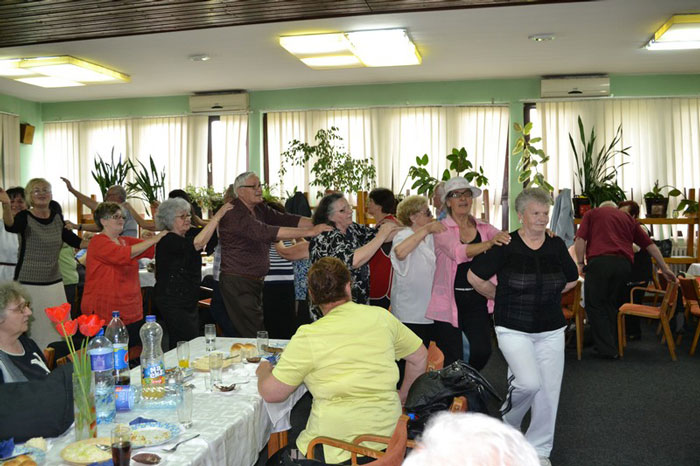Self-help groups
Within the scope of its work with older people the Red Cross of Serbia coordinates the work of 38 self-help groups for older people in 22 municipalities across the country.
These groups involve some 400 older persons and are organised in different communities: urban, rural, peri-urban. Their members are of different ethnicities and education level but all are about having active persons over the age of 65.
Self-help groups meet twice per month on the average but some of them meet every week. The most frequently discussed topics at their meetings are health and medication – the high price of necessary medical drugs for example, or the inadequate list of medication covered in full by health insurance, as well as the inadequate conduct of medical professionals. Other topics include poverty of older persons, inadequate pensions and social benefits. They also discuss concrete problems in their communities and how to solve problems of individuals and members of the group as well as of other older people in the community. In some cases these problems are solved with support of other civil society organisations.
An important feature of these groups is their sustainability – their functioning costs very little money. What they need is to have members motivated, to have a place to meet and provide small refreshments for the meetings (coffee, tea, juice…).
Flexibility is yet another important aspect of the work of self-help groups. They are not rigid constructs with unbendable rules, but quite the opposite, flexible, adaptable groups that allow their members to offer their own perspective on the problems in their immediate environment, articulate their own takes on the roots of these problems and offer possible solutions.
The project can also be seen as an advocacy platform for older people because it encourages them to be active in their local communities and advocate for changes that can lead to improved quality of their lives but also of other people in the community as well. This is activism and social inclusion of older people in real life. Ageing among other things can lead to losing one’s partner and friends and being active in one of these activist groups facilitates forging new friendships.
Another aspect of the work of self-help groups is that they help develop solidarity, among older people but also among members of different generations because some of the problems identified by older people and the proposed solutions also contribute to improving the quality of life of younger people in the community.
Older people are through this motivated to take initiative on solving problems of local communities and their initiatives have led to several successful solutions in different communities so far.
Since 2010 the Red Cross of Serbia (Nataša Todorović and dr Milutin Vračević http://www.inpea.net/contacts.html#national) has represented Serbia in the International Network for the Prevention of Elder Abuse (INPEA): http://www.inpea.net/. 2009 the Red Cross of Serbia and the HumanaS network of civil society organisations working on issues of ageing – and coordinated by the Red Cross of Serbia – joined the global advocacy campaign to adopt a new United Nations Convention on the rights of older people.
Day care centres
The Red Cross of Serbia has partnered with the Yanos Public Health NGO from the Netherlands through a MATRA project “Community-based care and support for the elderly” supported by the Netherlands’ Ministry of Foreign Affairs. Through this partnership two day care centres for older people have been established: one in the municipality of Pirot www.centarzadnevneaktivnosti.org.rs and another in the municipality of Kragujevac www.kutak.org.rs.

